Yeast to the rescue of rainforests
University team engineers a potential antidote to the world’s palm oil addiction.

Can this Australian yeast-based recipe address the environmental dilemmas of the global palm oil industry?
Tom Collier, a synthetic biologist at Macquarie University, has spent over a decade engineering yeast to produce a sustainable alternative to palm oil.
His company, Levur, is backed by the deep-tech investment fund Main Sequence, founded by CSIRO. Together, they aim to disrupt industries reliant on palm oil, beginning with the A$500 billion cosmetics market.
“Palm oil is extremely versatile and can be found in up to 70 per cent of cosmetic products, most commonly used in oils and soaps,” Collier said. “Processed palm oil is colourless and flavourless, making it a ubiquitous additive in food and personal care products.”
This versatility, however, comes at a price. With an immense environmental impact, from widespread habitat destruction to its heavy carbon footprint, the pressure is mounting on industries to find sustainable alternatives.
"We’ve engineered a strain of yeast that can produce a palm oil alternative, and most of the equipment we need can be found in a common brewery"
Levur’s technology employs yeast - a well-known organism - to produce the fats that mimic palm oil. By leveraging yeast’s natural fermentation processes in a similar way to beer brewing, he says the solution is not only scalable but cost-effective.
“We’ve engineered a strain of yeast that can produce a palm oil alternative, and most of the equipment we need can be found in a common brewery,” Collier said.
He studied hundreds of academic papers to design and engineer these yeast strains. Collier and his team also leveraged cutting-edge genetic engineering techniques to reprogram yeast strains to provide the oil substitute.
“The genetic code we have designed includes all the instructions the yeast needs to make our sustainable palm oil alternative. We just provide a feedstock for the yeast, and it grows it from there,” he said.
Saving orangutan habitats
Collier says his journey began in 2012 when he learned about the devastating effects of palm oil production during a trip to Borneo. Witnessing the destruction of orangutan habitats led Collier to seek a sustainable alternative.
“I saw the loss of habitat for one of our closest cousins, the orangutan, with whom humans share 97 per cent of our DNA,” he said.
While the company’s initial focus is on cosmetics and personal care, it believes its work could have application in the food industry.
With global demand for palm oil expected to quadruple by 2050, Collier says solutions like Levur’s are crucial. “Deep tech like ours takes significant time, in terms of research and development. However, we have our proof of concept, and we aim to introduce our product to the world soon.”
The company says it is currently preparing for another funding round later this year to scale its operations.
Using biotechnological processes like precision fermentation, Levur will supply raw materials to cosmetic manufacturers to create the final products such as shampoos, conditioners, and other personal care items. With a focus on yeast, it creates an alternative to palm oil by applying a similar process to brewing beer or wine. According to Levur, yeast is ideal because it is a single-celled fungi which makes it easy to work with to make fats, which can be cultivated as a sustainable substitute to palm oil.





